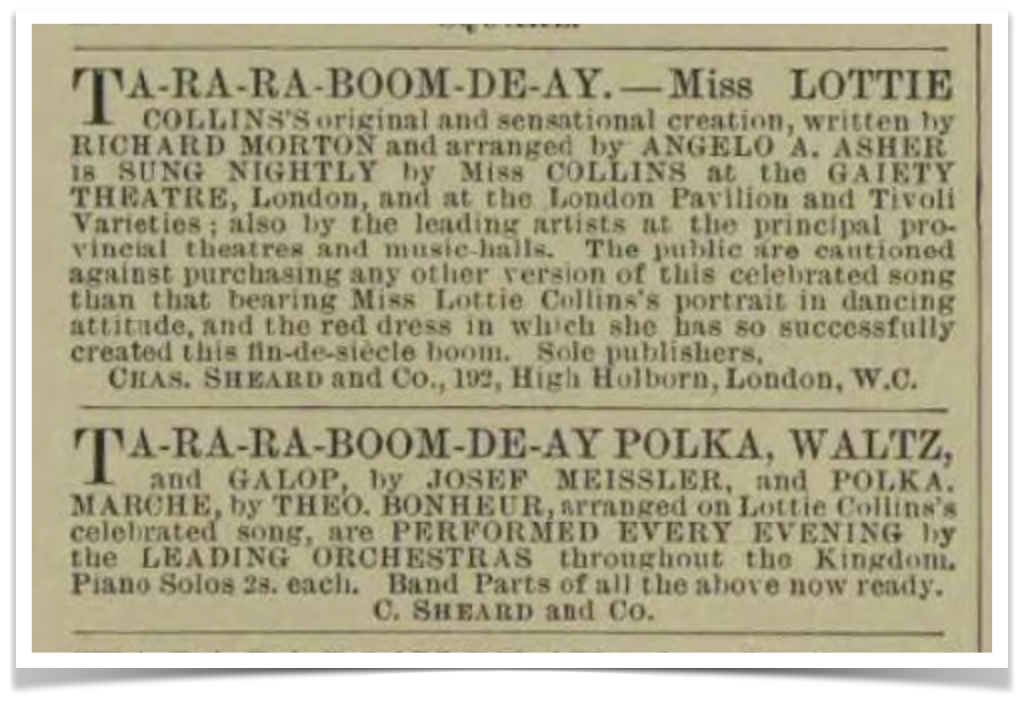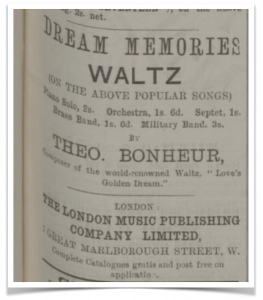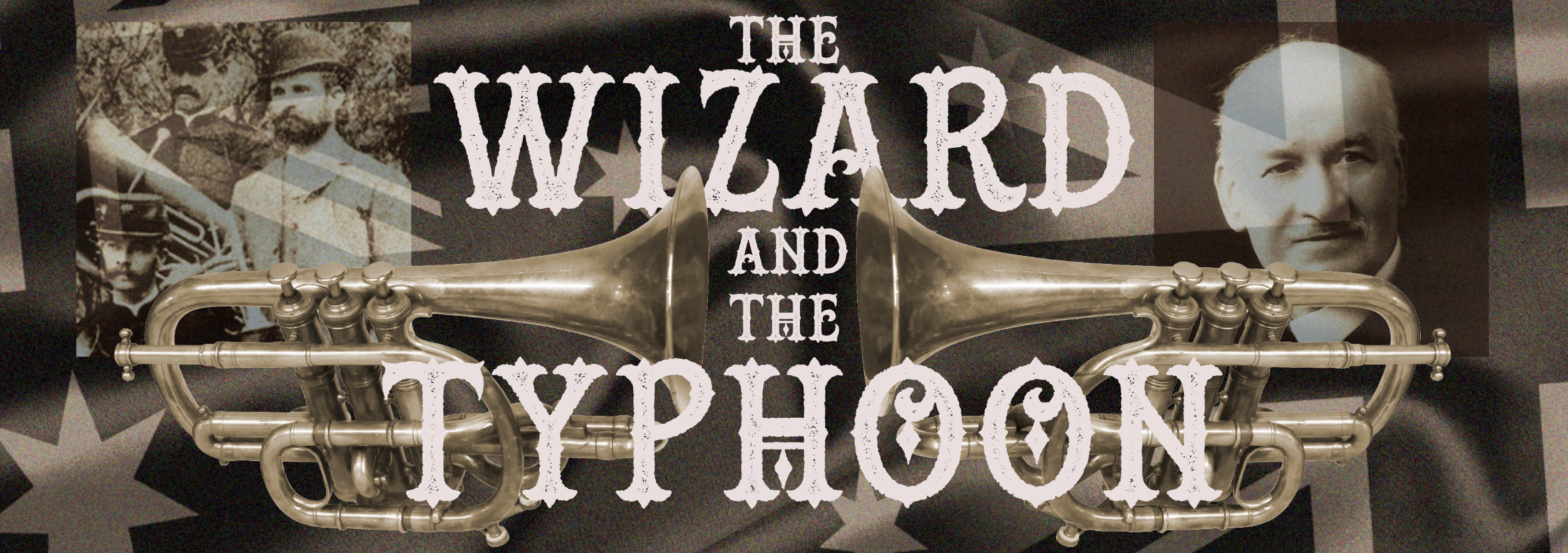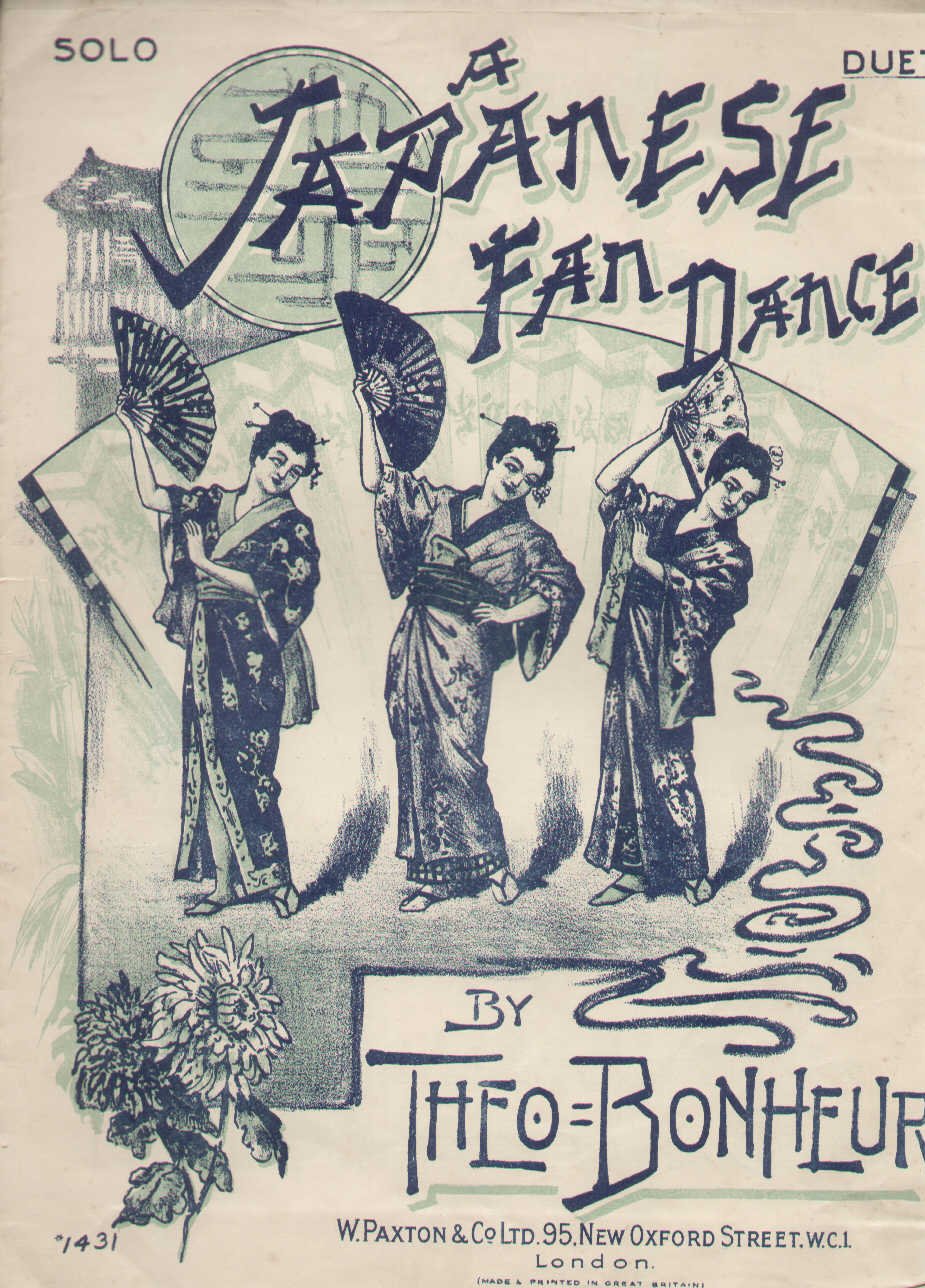This will be my third, and probably final, piece explaining another explainable misunderstanding in the musical identity of Thomas Edward Bulch, who as we, and others, have said elsewhere DID frequently compose under pseudonyms, but not necessarily all of the ones that have been associated with him.
It is my belief now that Thomas Edward Bulch almost certainly didn’t use Theo Bonheur as a pseudonym for his own creations. As in the other cases discussed in my more recent scribblings, he quite possibly arranged Bonheur compositions for brass, but probably was not alone in this.
Though as with Glasgow’s ‘Carl Volti’, and London’s ‘Charles Le Thiere’, Theo Bonheur was indeed a pseudonym; for someone else altogether. It was probably used for the same reason as in the case of Volti and Le Thierre. Those two cannot have been the only Victorian era composers to have found that their music sold more successfully when it was accompanied by an exotic sounding foreign name.
Thomas’s grandson, Eric Tomkins, in his family history which centres on Thomas Bulch, provides a terrifically plausible theory passed down through the family as to how Thomas may have settled upon Theo Bonheur as a pseudonym. His father, Charles Tomkins, had explained the name was taken from “Th” from Thomas, “E” from Edward, with “o” added to make Theo and “B” from Bulch to begin the surname. The family believed that both Bulch and another used the pseudonym – resulting in it not being possible to tell which pieces were composed by either. But who was the other claimant to the name Theo Bonheur?
Arthur Charles Rawlings was born to Arthur Charles Rawlings senior and his wife Frances, in London, in Marylebone on 3rd May 1857. He was baptised on 1st January 1860 at Bryanston Square St Mary, Westminster. He, and his brother Alfred William Rawlings, were taught to play piano by their father who was a piano tuner despite having been blind from birth. They also had an older sister Emily and younger brothers Halton and Ernest.
One account suggests that the children reportedly received attention from an orphanage run by Georgina Weldon, an acquaintance of the composer Charles Gounod, who spent some time in London. The extent to which both had an influence on the brothers is unknown.
The Rawlngs family lived at 15 then 57 East Street, Marylebone, London; then in the 1870s had moved to Casey Street. By 1881 Charles, still was still living with his father but now at 1 Vincent Street in the Westminster area (an area that has been much redeveloped since). That year sees Charles (who preferred his middle name) listed as a Musical Composer at 23 years of age.
A newspaper article in The Graphic of Sat 29 Oct 1881 reveals to us that, initially, he, as with many others, tried to compose under his real name. “Miscellaneous. Felicia Hemans’ beautiful poem, “The Better Land,” has been set so often by various composers, that we are surprised to find a new musical frame in which to re-set this gem. Charles Rawlings has succeeded in producing a ballad of medium compass, which deserves a good place in the list of this popular poetess’s musical admirers (Messrs. Goddard and Co.).” As most of his compositions were created under a pseudonym it seems that the characterisation of ‘Theo Bonheur’ was created at some point after this date.
The name Theo Bonheur itself first seems to appear in British newspapers in 1883, so that may have been the year in which Charles decided to switch to this identity. Incidentally this was the year before Thomas Bulch emigrated to Australia, so as a keen pianist he may well have seen, and become familiar with, works under that name.
The Graphic of 6th January 1883 tells of “”Concordia,” a grand march, for the organ, by Theo Bonheur, will prove a useful addition to the organists secular repertoire.” The Yorkshire Post of May that year expands the description to say “GRAND MARCH, “Concordia,” pour piano, par Theo Bonheur. London: Amos & Shuttleworth. – This march, which can be arranged either for the pianoforte or organ, does not belie its title of “grand.” The brief introduction is particularly striking. The march itself has the true martial ring in it, which is heightened at the con spirito movement, where there is a change of key to E flat, the return of the key to A flat being judiciously effected. “Concordia,” when known, should become popular. A word of warm commendation is due to the publishers for the boldness and clearness of the type, which is a credit to the firm.”
From available newspaper reports it appears as though the works of Theo Bonheur may have begun to be imported to Australia from around 1885 onwards, again giving Thomas Bulch, whom we should not forget was not long after that the proprietor of a music shop selling sheet music, as well as a pianist, to have seen and become familiar with the name. Surely having done so it would be unusual for him to have settled upon the same pseudonym. Initial references to Bonheur’s piano works in Australia include:
- 11 May 1885 – “The Red Scarf” (song) w. lyrics by G W Southey – The West Australian – performed at a Protestant Orphanage benefit.
- 10 Jun 1885 – “The Conquerors” (song) w. lyrics by G W Southey – The Argus – A review of this as new music explaining that the publishers are W Morley and Co, Regent Street, London.
- 24 Oct 1885 – “First In The Field” (song) – The Argus – Again citing W Morley and Co of London as publishers, but explaining that the pieces are available though Australian distributors Glen & Co., Nicholson & Co., Allan & Co., Elvy & Co., Paling & Co., G Reinhardt, Marshall and Son, Bullard & Co. and all music sellers.
Knowing that Thomas Bulch worked for both Allan and Co, at least, if not others, it’s highly likely that he’d have seen the name and that might have dissuaded him from using it himself.
But we do, also, see soon after evidence of Theo Bonheur’s compositions being arranged by others to suit new formats. The New South Wales Advertiser of 15th May 1886 tells of a smoke concert of the Sydney Liedertafel at the Protestant Hall the previous Tuesday where it speaks of how “”The Clang of the Hammer” – which though composed as a song by Theo. Bonheur, owes much to Mr. Alfred J. Caldicott, who has arranged it for male voices – a dashing vigorous chorus, with a pretty love story to give sentiment to the music, caught the fancy of the audience and was redemanded and repeated.”
Then we start to see cases of the music being arranged for brass band, which seems unlikely to have been done by Rawlings/Bonheur himself. Interestingly the first case I have found of this is in the Ballarat Star of 5 Dec 1890 “Bulch’s Model Brass Band will play the following programme of music on the balcony of the North Grant Hotel. Bridge Street, this evening, commencing at 8 o’clock —March, “Montana” (Wallace); waltz, “Twilight Shadows” (R Smith); overture, “Golden Rose” (Richards), polka (tonguing), “Queen of Beauty” (Bulch); march, “ The Tournament” (Theo. Bonheur); waltz, “Summer Showers” (Keller); quadrille, “Ally Sloper” (Robinson); gallop, “ The Opossum Hunt” (Bulch).”
Bonheur’s piano march “The Tournament” as with his other pieces (see list at the foot of this article) was published by a London music publisher that had published other pieces by the same composer. The key implication, so pivotal to the case that Thomas Bulch was not ‘Theo Bonheur’ is that as it is Bulch’s band playing the piece and he is still the bandmaster of this band until the following year, is that he was aware of Theo Bonheur as a composer and unlikely to have shown disrespect to a fellow composer by using the name himself. It also makes it more possible (but not certain) that Bulch was the ‘arranger’ of the piece and thereby possible that hallmarks of his style and character of brass arrangement could be present in the piece. That may well have been a reason the family associated Bulch and Bonheur.

In 1893 the Bendigo Advertiser gives another example of the appearance of a brass arrangement of a Bonheur work. “The grandstand and lawn were never seen to better advantage than they were yesterday. The green, sward was like a carpet to walk upon, the flower beds looked their best and the grandstand, well filled with fashionably dressed ladies, presented a most attractive appearance. Northcott’s Bendigo Brass Band occupied their usual place on the lawn, and at intervals during the afternoon rendered the following selections in an artistic and finished style :—Quick March, “Ballarat” (T. E. Bulch); grand selection, “Gems of Ireland (H. Round): waltz, “Crème de La Creme” (J. Robinson); schottische, “Merry Moments” (Carl Albert); quadrille, “The Sailor Prince ” (H. Round) ; selection, “Babylonia” (Warwick Williams); waltz, Blumen Am Wege, “Flowers by the Wayside” (Karl B. Keller); quick march, ” The Repulse” (J. Robinson); selection, “II Barbiere” (Rossini); waltz, “When the Lights are Low” (Theo. Bonheur); galop, ” On the Wings of Love’ ‘(E. Newton); “God Save tho Queen.””
Back in Britain, by 1891 Charles Rawlings is seen to be living at 50 Crawford Road in an elegant town house in Islington with wife Eliza (formerly Elise Rose Garello, the daughter of a bootmaker from Torino, Italy that had set up business on Berners Street, Marylebone, whom he married at the end of 1881) and children Elsie, Josephine, Emily, Rosa, Nita and Theodore. The family also have a servant.
The family are joined by Marion and Alexander before 1901 when the children’s bling grandfather Charles, presumably retired, has moved back in with them aged 75 years. By this year they are living in Fortess Road in Kentish Town. You’ll notice that the youngest son there was given the name Theodore, for which of course ‘Theo’ is a shortened form, so in a way you could say the son was named after his father, or at least his father’s pseudonym.
Like Thomas Bulch, Arthur Charles Rawlings used other pseudonyms, some of which are believed to be Faulkner Brandon, Gordon Temple, Maurice Telma, Paul Perrier, Emerson James, Auguste Cons, Dennis Duprez, Jean Douste and Gilbert Loewe. Seemingly hundreds of tunes emerged through his pen, though few have prevailed. ‘Theo Bonheur appears to have composed exclusively for the piano but there is evidence of his pieces being arranged for other instrumentation and published by London publishing houses such as this advert from the Volunteer Service Despatch and Military Gazette of 26 August 1893

Charles, and ‘Theo’, died on 29th January 1919 at the Great Northern Hospital Middlesex. The Era of Wednesday 12 Feb 1919 included this brief notice “Mr. Charles Rawlings died recently at his residence in Pemberton Gardens, Upper Holloway, at the age of 62. For many years, under his professional name of Theo Bonheur, he was well known as a composer.” By the time of his death it appears he was not a wealthy man, leaving only £94 to his wife Elise and separately £40 to his daughter Nita
His wife, Elise Rose outlived him, surviving till 2 Jan 1928 where she passed away at her home in Streatham, Surrey, leaving her estate to daughters Josephine and Nita.
Across British and Australian library collections there are many works attributed to Bonheur. The Australian library collections include a great many London published works suggesting that they were imported quite freely. There are a few cases of works published in Australia, though not all exclusively there and of those there is evidence that they are part of a series with others being published in London – for example “Dance of the Goblins” and “Dance of the Sprites”. Bonheur’s compositions (for piano) include the following, though this is by no means an exclusive list – it is also worth noting that all these are sets of piano music, the libraries to not appear to hold band sets:
- 1897 Victorian Celebration – (descriptive piece for piano) – London, Phillips & Page
- Across the Prairies: An Indian Ride – W Paxton & Co, New Oxford Street, London
- Advance Guard, The – (march) – W Paxton & Co, New Oxford Street, London
- An Autumn Ride – W Paxton & Co, New Oxford Street, London
- A Hunting Day – (sketch) – W Paxton & Co, New Oxford Street, London
- A Japanese Fan Dance – (duet) – W Paxton & Co, New Oxford Street, London
- A Japanese Cherry Dance – (duet) – Chappell & Co, Sydney
- A Japanese Ride – W Paxton & Co, New Oxford Street, London
- A Russian Fete Day – London : Reynolds
- A Spring Ride – W Paxton & Co, New Oxford Street, London
- A Summer Ride – W Paxton & Co, New Oxford Street, London
- A Winter Ride – (descriptive fantasia) – W Paxton & Co, New Oxford Street, London
- Battle Eve, The – (duet) with lyrics by G W Southey – London, Edwin Ashdown
- Beneath the Stars – (song)
- Bow-Wow – (schottische) – Francis & Day, London
- Boys of the Ocean Blue – (song)
- Brave Boys – (spirited march) – London : F. Pitman Hart & Co
- Breakers Ahead – (song) with lyrics by Clement Scott
- Brothers in Arms – (descriptive piece) – W Paxton & Co, New Oxford Street, London
- Burlesque – (schottische)
- Carlton, The – (cake walk) – Cassell & Co, London
- Charlie Chaplin’s Frolics – (eccentric dance) – W Paxton & Co, New Oxford Street, London
- Cloudland – (waltz) – Somerset and Co, Berners Street, London
- Cherry Blossoms – (march) – London : Gould & Bolttler
- Christmas Roses – (song) with lyrics by Clifton Bingham – W Paxton & Co, New Oxford Street, London
- Coon’s Courtship, The – (schottische) – W Paxton & Co, New Oxford Street, London
- Coraline – (intermezzo) – London : Reynolds & Co
- Cycle Parade, The – (march)
- Dance of the Goblins – (intermezzo) – W. H. Glen & Co, Melbourne
- Dance of the Sprites – Evans, London
- Dance of the Witches –
- Dreadnought, The – (descriptive fantasia) – W Paxton & Co, New Oxford Street, London
- Dream Memories – (waltz) on Lynsey Lennox’s popular song – London Music Publishing
- Duetto – (intermezzo) – Chappell & Co, Sydney
- Dulcibel – Chappell & Co, Sydney
- Eileen Alannah – (waltz) – on J R Thomas’s popular song – London, Evans
- Esmarita – (polish dance) – London Music Publishing
- Espanola – (spanish dance) – Melbourne, Allan and Co
- Fairy Fountain – (intermezzo) – London : Warren & Phillips
- Forevermore (grand sacred song) – words by Seymour Ellis – London, Wickins & Co.
- Frascati – (waltz) – W Paxton & Co, New Oxford Street, London – 1898
- Gaiety – (schottische) – London : Ransford & Son – 1892
- Gaiety Girl, The – (skirt dance) – W Paxton & Co, New Oxford Street, London
- Gate of Mercy, The – (song) with lyrics by Stanhope Gray – London : F. Pitman Hart & Co
- Gay Gordons, The – (march) – W Paxton & Co, New Oxford Street, London
- Grannie’s Rings – (song) – words by Arthur Chapman – Allan and Co. Collins Street, Melbourne
- Grenadiers – (polka march) – Somerset & Co, London
- Hawthorn Blossoms – (schottische) – London : Gould & Bolttler
- Hilarity – (humoresque) – W Paxton & Co, New Oxford Street, London
- High Jinks – (quadrilles) – London
- Hippodrome – (march) – W Paxton & Co, New Oxford Street, London
- Imperial Federation – (march) – W Paxton & Co, New Oxford Street, London
- In the Meadows – (intermezzo) – W Paxton & Co, New Oxford Street, London
- Jellicoe Touch, The – (naval fantasia) – W Paxton & Co, New Oxford Street, London
- Jolie Pas – (danse)
- Killarney – Balfe’s beautiful song transcribed for piano – W Paxton & Co, New Oxford Street, London
- King’s Own, The – (song) with lyrics by Herbert K Crofts, music by Theo Bonheur – Ascherberg Hopwood & Crew Ltd, London
- King’s Territorials – (quick step) – W Paxton & Co, New Oxford Street, London
- Klondyke Mail, The, – W Paxton & Co, New Oxford Street, London
- La Soiree – (two step) – W Paxton & Co, New Oxford Street, London
- Les Petits Soldats – (polka) – London : Francis Bros. & Day
- Little Soldiers, The – (vocal waltz) F Amos and Co, Berners St & Oxford St, London
- Love’s Golden Dream – The Lavender Music Publishing Company Ltd
- Lucerna – (waltz) – The Lucerna Anglo-swiss Milk Chocolate Co Ltd, London
- MacDonald, The – (march) – W Paxton & Co, New Oxford Street, London
- March of the Gladiators – (march) – W Paxton & Co, New Oxford Street, London – 1911
- March to Pretoria – (march) – W Paxton & Co, New Oxford Street, London
- May and December – (waltz) – London : David Wilcock
- Maypole – (dance) – London : London Music Publishing
- Nuit D’Amour – (waltz)
- Oh Rest In The Lord – (musical kindergarten sketch) – Charles Shearer, London
- Olde and New – (gavotte) – Wickens, London
- Old Fogies – (quaint dance) – W Paxton & Co, New Oxford Street, London
- On Summer Seas – (barcarolle) – W Paxton & Co, New Oxford Street, London
- Picaninnies Bed Time – (dance) – W Paxton & Co, New Oxford Street, London
- Pit-A-Pat – (polka)
- Power of Love, The (from Satanella) – (musical kindergarten sketch) by M.W.Balfe – Charles Shearer, London
- Pres D’Or – (waltz) – The Lawrence Wright Music Company, Denmark Street, London
- Princess Maud – (waltz) – W Paxton & Co, New Oxford Street, London
- Prince of Wales, The – (grand descriptive fantasia) J H Larway, Newman St, London
- Rink Courtship – W Paxton & Co, New Oxford Street, London
- Queen’s Review, The – (march) – London : David Wilcock
- Rose Blooms – (waltz) – W Paxton & Co, New Oxford Street, London
- Royal George – (naval march)
- Royal Naval Exhibition, The – (polka) – Alphonse Cary Oxford Street, London
- Santa Rosa – (waltz) – W Paxton & Co, New Oxford Street, London
- Seville – (spanish selection) – W Paxton & Co, New Oxford Street, London
- Shamrock, The – (waltz) – W Paxton & Co, New Oxford Street, London
- Siege of Constantinople, The – (descriptive fantasia) – W Paxton & Co, New Oxford Street, London
- Siege of Ladysmith, The – (grand divertimento) – Moore Smith & Co, Poland St, London
- Silver Moon – (barn dance) – W Paxton & Co, New Oxford Street, London
- Skipping Rope Dance – (dance) – Melbourne : W.H. Glen & Co – London : Beal, Stuttard & Co.
- St George For England – (grand march) – W Paxton & Co, New Oxford Street, London
- Sundown Memories – (song) with lyrics by Southwell Alvey
- Sweetheart Mine – (waltz) – London
- Sylvan Rebels – (air de danse) – W Paxton & Co, New Oxford Street, London
- Sylvan Queen – (intermezzo) – Chappell & Co, Sydney
- Takes The Cake – (cakewalk) – W Paxton & Co, New Oxford Street, London – 1903
- Ta-Ra-Ta-Bom-Tra-La – (marsch polka)
- Teddy Bear’s Frolic – W Paxton & Co, New Oxford Street, London
- Tops and Bottoms – (barn dance) – W Paxton & Co, New Oxford Street, London – 1898
- Tournament, The – (march) – Bosworth and Co. London.
- Transvaal, The – (march) – W Paxton & Co, New Oxford Street, London
- Tres Piquant – (intermezzo) – London : Ascherberg, Hopwood & Crew ; Sydney : Chappell & Co,
- A Spring Ride – (descriptive fantasia) – W Paxton & Co, New Oxford Street, London
- A Summer Ride – (descriptive fantasia) – W Paxton & Co, New Oxford Street, London
- Victoria Diamond Jubilee March, The – W Paxton & Co, New Oxford Street, London
- Victorian Celebration – 1897 – Phillips & Page
- Washington Post, The – (barn dance) – London : Mathias & Strickland
- When the Boys Come Marching Home – (march) – W Paxton & Co, New Oxford Street, London
- Woodbine Willie – (two step) – W Paxton & Co, New Oxford Street, London
- Zinska – (russian dance) – London : London Music Publishing
The following are a few of the references I have found to Theo Bonheur compositions being played by brass bands in Australia, Scotland and England. I see no real pattern in these or evidence that helps to determine whether any were arranged by Thomas Bulch.
Belle Etoile (waltz)
- Longreach United Friendly Societies Band – The Western Champion and General Advertiser (Aus) – 06 Apr 1897
Danse Carnival
- The Oxted Band – The Sussex Agricultural Express (Eng) – 14 Apr 1894
Dream Memories (waltz)
- Norseman Brass Band – Norseman Times (Aus) – 16 May 1902
Eileen Alannah (waltz)
- South Sydney Orange Band – Sydney Evening News (Aus) – 16 Jan 1906
- The R. A. A. Band – Sydney Evening News (Aus) – 27 Feb 1906
- The R. A. A. Band – Sydney Evening News (Aus) – 15 March 1910
- Burrangong Town Band – The Young Witness (Aus) – 19 Oct 1915
- The Brisbane Federal Band – The Brisbane Telegraph (Aus) – 5 March 1927
Endymion (gavotte)
- Hull Police Band – Hull Daily Mail (Eng) – 26 June 1895
- Sunderland Municipal Band – Sunderland Daily Echo and Shipping Gazette (Eng) – 11 Jun 1902
Her Grace (waltz)
- Geelong Town Band – Geelong Advertiser (Aus) – 26 Nov 1896
- Locomotive Junior Brass band – The Advertiser, Adelaide (Aus) – 27 Jan 1910
Les Mosquitaires (march)
- Unnamed band – Aberdeen Press and Journal (Sco) – 5 Oct 1898
Lily Queen (waltz)
- Sunderland Municipal Band – Sunderland Daily Echo and Shipping Gazette (Eng) – 16 July 1902
Love’s Golden Dream (waltz)
- The Locomotive Band – The Advertiser, Adelaide, (Aus) – 10 Apr 1899
Mine Alone (waltz)
- Mr Woods Band (this may not be a brass band – this was in an art gallery) – Aberdeen Evening Express (Sco) – 16 Oct 1886
The Queen’s Review (grand march)
- Unnamed band – Sunderland Daily Echo and Shipping Gazette (Eng) – 25 July 1898
Starlight (intermezzo)
- Unspecified Military Band – The Advertiser, Adelaide (Aus) – 19 Sep 1898
- Band of the City Rifles VB Blackwatch – Dundee Courier (Sco) – 7 Aug 1901
- 1st (City of Dundee) VBRH Band – Dundee Courier (Sco) – 4 Jun 1902
Sweet Roses (waltz)
- Sunderland Municipal Band – Sunderland Daily Echo and Shipping Gazette (Eng) – 19 Jun 1902
The Tournament
- Bulch’s Model Band – The Ballarat Star (Aus) – 5 Dec 1890
- The Anchor Brewery Band – Eastern Daily Press (Eng) – 17 Aug 1896 (with pieces by Bulch and Volti)
When the Lights Are Low (waltz)
- Northcott’s Bendigo Brass Band – The Bendigo Advertiser – 30 Nov 1893
- The Anchor Brewery Band – Eastern Daily Press (Eng) – 17 Aug 1896 (with pieces by Bulch and Volti)
- Maclean Brass Band – Clarence River Advocate – 5 Dec 1902

